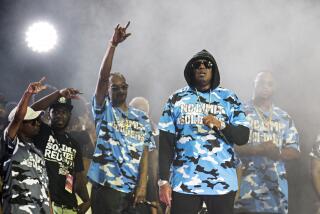Scrappy label thrashes the big boys
Maybe the pop world is finally ready to believe what Calendar predicted nearly four years ago: that by concentrating on cutting-edge rock and rap music, upstart Interscope Records would become the envy of the music industry.
The Westwood-based company, which launched in late 1990 as a joint venture with Time Warner, stunned its competitors last fall by becoming the first label in the modern pop era to capture the four top positions on the nation’s album charts in a single week, thanks to releases by Bush, Tupac Shakur, Snoop Doggy Dogg and No Doubt.
Battling rivals 10 times its size, Interscope went on to dominate the competition throughout most of the lucrative Christmas rush--nabbing the top spot on the Billboard chart for the past eight weeks.
Previously branded as a “gangsta rap” or “radical rock” label, Interscope emerged in 1996 as a full-service record company with a string of mainstream hit acts ranging from the radio-friendly No Doubt to roots-rockers the Wallflowers to traditional R&B purveyors Blackstreet.
Interscope’s success is even more amazing when you consider it was just 15 months ago that Time Warner Chairman Gerald Levin made the shortsighted decision to dump the label following a rap lyric controversy. Interscope co-founders Jimmy Iovine and Ted Field quickly cut a more profitable deal with Seagram-owned MCA, which purchased half of the company in February for $200 million.
FOR THE RECORD:
Record executive--A Jan. 5 Pop Eye column incorrectly identifiedrecord industry veteran Henry Droz as one of several top executives whowere fired during a corporate shake-up at the Warner Music Group. Droz,who now runs MCA’s distribution arm, retired from his post as chief ofdistribution at Warner in 1993 after 16 years on the job.
With Interscope in tow, MCA instantly gained new credibility as a rock powerhouse and even jumped temporarily from last to first place last fall in terms of new album sales (when older, catalog titles are counted, MCA is fifth in overall album sales). In addition, MCA bolstered its image by recruiting several of the top executives recently fired by Warner, including Doug Morris, Henry Droz and Bob Krasnow. Highly regarded veterans Mo Ostin and Lenny Waronker also resurfaced at David Geffen’s MCA-distributed DreamWorks label.
To be sure, the dramatic restructuring of MCA has focused the eyes of the industry on a bold new corporate player: Seagram chief Edgar Bronfman Jr., whose empowering and charismatic approach is being likened by some to that of the late and beloved Warner titan Steve Ross.
Although it will take time to determine whether Bronfman’s revitalization plan will pay off, many already believe that Time Warner’s days as the undisputed industry leader are numbered. Indeed, power shifted last year in the $12-billion business, with Sony, PolyGram, BMG, MCA and the independent label sector already beginning to close the gap on Warner’s lead.
Here’s how the major companies fared last year, based on SoundScan estimates of U.S. market share as well as interviews with key industry figures, who evaluated labels on both image and performance. The corporations are listed in order of domestic market share for new product only (excluding older, catalog albums) through Dec. 22.
WARNER MUSIC: 21%
Warner Bros: New co-Chairmen Bob Daly and Terry Semel have succeeded in calming the waters at Time Warner’s troubled music division, but few insiders believe the new triumvirate of label chiefs will be able to return the corporation to its glory days. While Warner continues to dominate the domestic market, the talk is that the Bunny really no longer has anything special to offer artists over the competition.
With R.E.M.’s latest release getting off to a slow start, it was Madonna’s tiny Maverick Records that saved the day, delivering the year’s best-selling album, from Alanis Morissette. Warner also counted on Enya, Van Halen, Seal and Faith Hill to keep the cash registers ringing. It’s still too early to tell what kind of imprint Chairman Russ Thyret will put on the label, but outside of re-signing R.E.M. and pink-slipping practically the entire black music department, things so far have been exceedingly quiet during Thyret’s tenure.
Atlantic: Val Azzoli, on the other hand, shook things up at Atlantic last year, axing dozens of employees and artists as well as cutting ties with several unprofitable joint ventures. The verdict is still out on whether Azzoli has the creative vision to revive Atlantic, but the label quietly nudged along such acts as Jewel, Donna Lewis, Seven Mary Three, Poe, Junior M.A.F.I.A. and Lil’ Kim. Hootie & the Blowfish’s second release has sold only about a fifth of the 10 million chalked up by the band’s debut. Old Atlantic standby Phil Collins bombed.
Elektra: Is there anyone left who still thinks a black woman can’t run a rock label? If so, they obviously weren’t paying attention to Sylvia Rhone’s spectacular results last year at Elektra, which she took over in 1994. For the second year in a row, Elektra ranks as Warner Music’s most profitable label, thanks to an eclectic string of hits from such acts as Metallica, Tracy Chapman, Keith Sweat and Natalie Merchant. Possible goof: Prodigy, the English techno-dance wonder Rhone trimmed from the roster during massive cuts two years ago, became the target of the biggest ongoing bidding war.
SONY: 14.4%
Epic: Among the crucial details unmentioned in Vanity Fair’s vindictive profile of Sony Music chief Tommy Mottola was the fact that Sony Music posted record results in 1996 and delivered four of the year’s Top 10 selling albums. The whopping success of Celine Dion’s 6-million-selling “Falling Into You” offered proof that Mottola’s wife, Mariah Carey, is not the only pop star benefiting from the masterful Sony marketing machine. Epic’s David Glew and Richard Griffiths--with 550 Music’s Polly Anthony--also pumped out a stream of hits from Oasis, Rage Against the Machine, Ghostface Killah and, though somewhat disappointing, Pearl Jam. In addition, Jeff Ayeroff and Jordan Harris finally put their Work label on the map with a new album from media darling Fiona Apple.
Columbia: Aggressive Chairman Don Ienner took charge again last year at Columbia, transforming underground rap act the Fugees into one of the year’s biggest mainstream pop hits. Ienner’s hot label produced a broad range of hits from Mariah Carey, Nas, the Presidents of the United States of America, Stabbing Westward and Alice in Chains, as well as breakthroughs from a number of new acts, including Maxwell and Primitive Radio Gods.
BMG: 12.4%
Arista: BMG is never going to win an award for being the hippest record company in the music business. But image isn’t everything--particularly when you’ve got a hit-maker like Clive Davis on your payroll. Last year, Arista and its affiliated labels churned out almost as many top sellers as the entire EMI complex--an organization 10 times its size. Davis, who was declared the industry’s executive of the year in the 1995 Pop Eye roundup, expanded his pop credentials in 1996 with a gang of hits from LaFace, Rowdy, Bad Boy and Arista Nashville. Despite a snub from the Oscar voters, Arista’s breathtaking “Waiting to Exhale” soundtrack went on to sell nearly 3 million albums. Other big sellers: Whitney Houston, Kenny G, Tony Rich, Toni Braxton, Monica, Brooks & Dunn and Alan Jackson. OutKast and Goodie Mob gave Arista a bolder presence in the rap field too.
The problem for BMG is that nothing much else is happening in the German conglomerate’s empire except for Zomba, home to multimillion-selling R&B artist R. Kelly and Too Short. Everyone is still wondering what Bob Jamison is going to do at RCA, which had some success again last year with the Dave Matthews Band. The only real breadwinner at Zoo, which closed down its West Coast division last year, is Tool.
PolyGram: 11.4%
A&M: PolyGram Chairman Alain Levy’s vision sputtered some last year after music from such costly investments as Motown, Island and A&M went into a down cycle for much of 1996. No one is quite sure why Levy decided to install British record executive Roger Ames as American chief or how he plans to resuscitate the moribund Motown. A&M’s market share slipped last year because of moderate showings from Soundgarden, Blues Traveler, Sting and Sheryl Crow. Domestic disappointments came from superstars Bryan Adams and Janet Jackson (a greatest-hits package in her case), neither of whose last albums sold more than half a million copies.
Island: Label president Johnny Barbis got the boot following friction between him and Island founder Chris Blackwell over artist development practices. Sales, too, were slow at Island despite meager spurts from the Cranberries and Melissa Etheridge. PolyGram is banking on a new U2 album and the fact that Blackwell is back taking a more hands-on approach to running the company to help Island rebound.
Motown: Laggardly sales and lavish spending at Motown could cut short the reign of recently appointed ruler Andre Harrell.
Mercury: Danny Goldberg bolstered Mercury’s market share and image by adding Capricorn and Def Jam to the mix, capitalizing quickly on hits from 311 and “The Nutty Professor” soundtrack. Backed by strong sales from Shania Twain and Joan Osborne, Goldberg went on a signing spree last year. Competitors are now waiting to see whether Goldberg, who has completely restructured the label, will succeed in redefining Mercury’s image.
MCA: 11.2%
Interscope: Nobody is calling MCA the Music Cemetery of America anymore. Long ridiculed as an industry dumping ground, MCA has done an about-face on the watch of new Chairman Doug Morris, quickly establishing itself as a major presence in the alternative rock market. Much of MCA’s current standing can be attributed to the spectacular showing of Interscope, which distributes for the Trauma, Nothing, Aftermath and wildly successful Death Row--whose future, though, has been thrown into uncertainty by the incarceration of owner “Suge” Knight. Interscope not only has a bevy of pop and rock wonders on its roster, including Marilyn Manson and Nine Inch Nails, but the company also boasts a host of the nation’s premier black producers, including Dr. Dre, Teddy Riley, Organized Noize and--it’s soon to be announced--R. Kelly.
Geffen: Things were sluggish again at Geffen last year, but the West Hollywood label managed to deliver modest hits by Beck and Counting Crows. Geffen-affiliated Almo Sounds Records, which is run by industry veterans Jerry Moss and Herb Alpert, also broke rock newcomers Garbage and drew critical acclaim for folk singer Gillian Welch. George Michael’s album was a disappointment, but DreamWorks generated a strong buzz with the first Eels album.
MCA Records: MCA’s potent country and R&B divisions continued to perform well with hits by Reba McEntire, Vince Gill and New Edition, but the flagship label’s rock roster still languished on the watch of new managers Jay Boberg and Abby Konowitz. Not much is happening yet either at Universal Records, MCA’s fledgling sister label in New York--except for hits from rappers Crucial Conflict and the Lost Boyz.
EMI MUSIC: 8.2%
Capitol: If only its market value would shrink as much as its market share has in recent months, it wouldn’t take long for the British conglomerate to lure MCA or Disney to the table and cash out. But at an asking price of more than $8 billion, EMI is still about $2 billion too costly for any competitor to seriously consider making a bid. Although EMI reported an increase in worldwide profits in 1996, the corporation plunged to last place in the U.S. market as the final strip mining of the Beatles catalog came to a halt. Charles Koppelman’s much-hyped “Luv Collection” compilation bombed badly but Capitol’s Gary Gersh continued to trudge along, turning in hits from Garth Brooks, Everclear, the Butthole Surfers and the hot “Romeo & Juliet” soundtrack. Gersh also forged a label deal with much sought-after producer Glen Ballard, who helped shape Alanis Morissette’s hit album.
EMI: After the smoke cleared around last year’s huge D’Angelo album, there wasn’t anything else to put out at EMI except Davitt Sigerson’s cigar.
Virgin: What is going on over at Virgin Records? Morale is down at the once-thriving domestic division of the $1-billion EMI acquisition, which languished last year with only the Smashing Pumpkins and the Geto Boys making waves on the pop chart. Lots of gossip inside and outside the company about meddling by one senior executive’s spouse.
INDEPENDENTS: 20.3%
This category--which includes dozens of small, independent labels, some of which are privately owned and some financed by the major labels--shows that a growing percentage of the record business is moving outside of the traditional distribution system. As the Internet and digital technology become increasingly available to artists, the power of the major labels will erode even further. Ani DiFranco has proven with her tiny Righteous Babe Records that you can generate national attention and six-figure sales without depending on the majors at all. Other artists are likely to be tempted when they notice that she owns all her own masters and makes twice as much money from each album as any pop superstar.
More to Read
Start your day right
Sign up for Essential California for news, features and recommendations from the L.A. Times and beyond in your inbox six days a week.
You may occasionally receive promotional content from the Los Angeles Times.






